#tel-el-kebir
Text
Lest we Forget.
It's Anzac Day here, and in the grand tradition of such morose and weighted occasions, here's a sample of Anzac humour:
'At Tel-el-Kebir at one point [Egypt, in 1916], a battalion of Australian soldiers is put on parade to be informed that the General Officer Commanding, an Englishman, desires the use of bad language to be cut out, most specifically the words 'fuck' and 'c-nt', as in any case he understands that these two words are not used in Australia.
'At this point, a voice rings out from the back of the parade: 'The fucking c-nt's never been there!'
Or my fave:
'Perhaps the lack of deference [to the English officers] is just in the Australian blood? ... when a British officer told off an Australian for not saluting him, the friendly Australian reached out, gave him a pat on the shoulder, and said, 'Young man, when you go home, you tell your mother today you've seen a real bloody soldier.'
[Both quotes are taken from Peter Fitzsimons' book, Fromelles and Pozieres: In the Trenches of Hell which I re-read every April in memorium.]
51 notes
·
View notes
Text
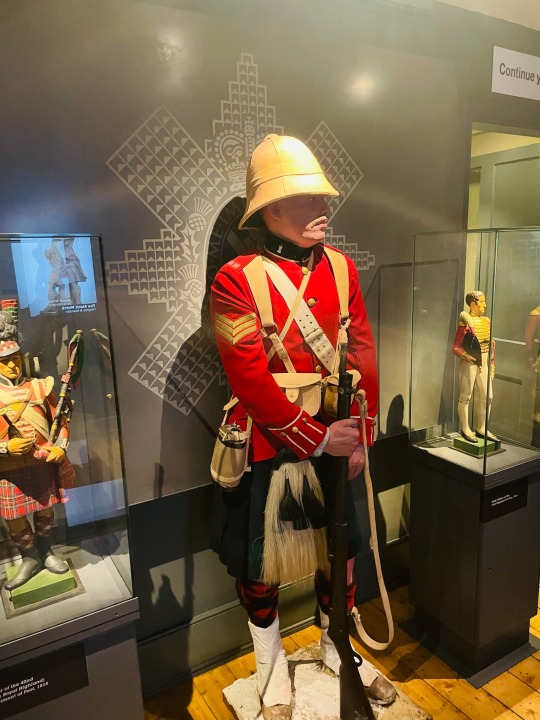
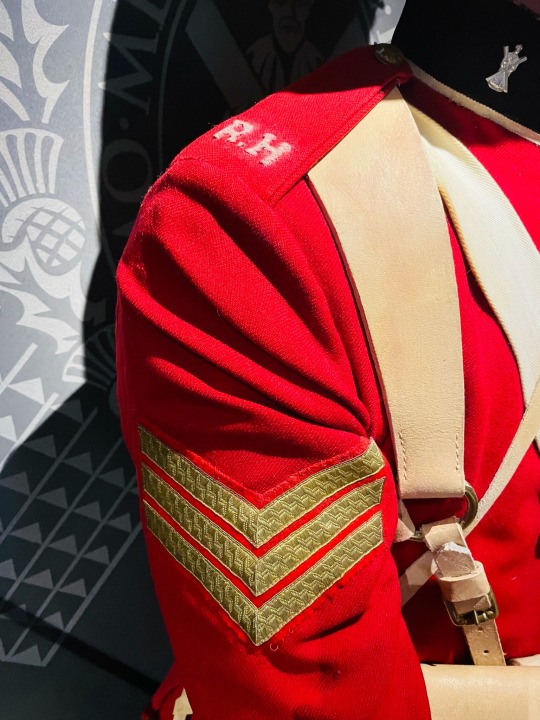

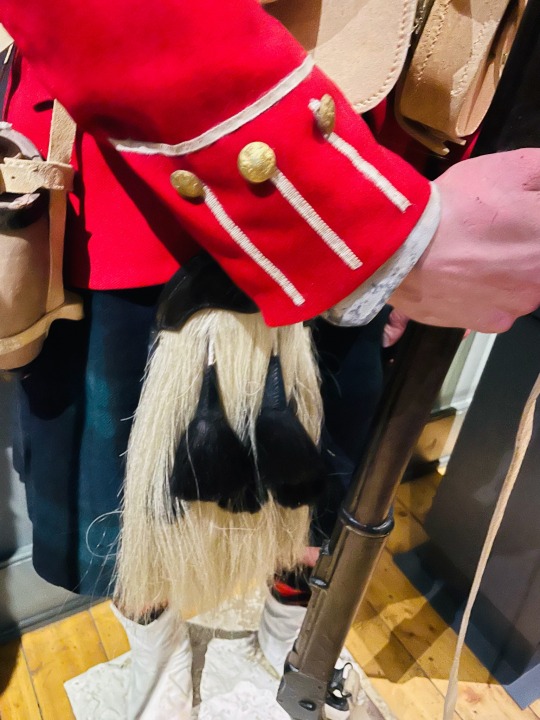
From the Black Watch museum’s life-sized display of how the regiment was uniformed and equipped at the battle of Tel El Kebir in 1882.
#black watch#royal highland regiment#scotland#scottish#kilt#highlander#highlanders#19th century#british empire#victorian#history#military history#british army#redcoat
24 notes
·
View notes
Photo

13th September 1882 - Egypt. The Battle of Tel-el-Kebir was an attack by the British on an Egyptian fortified redoubt at Tel-el-Kebir, about 100 miles north west of Cairo. Sir Garnet Wolseley ordered a nightmarch of 4 miles over the desert starting at 1am. The element of surprise was achieved and the attack began just before dawn. The 2/18th had to charge their apportioned section of trenches as soon as they finished the march. C and D Companies were in front, B and E in support with the remainder in reserve. Almost without firing a shot they swept forward and stormed the trenches with the bayonet. They were subjected to badly aimed fire and at one point were shot at from the flank. Two men, Corporal Devine and Private Milligan, dashed forward into the mass of the enemy behind the first line of defence, and were overwhelmed by the Egyptians. The Egyptians were driven back, and fled from the second line of defence. The pursuit continued for a while but was called off so that they could re-form for any further action. The photo is of a print produced after the war. The troops on the day would not have been so well turned out. Their helmets, belts and pouches were also dyed khaki for the campaign. #18thfoot #royalirishregiment #redcoat #britisharmy #britishempire #egypt #telelkebir https://www.instagram.com/p/Cic1ST8jSKi/?igshid=NGJjMDIxMWI=
2 notes
·
View notes
Text
Events 9.13 (before 1950)
585 BC – Lucius Tarquinius Priscus, king of Rome, celebrates a triumph for his victories over the Sabines, and the surrender of Collatia.
509 BC – The Temple of Jupiter Optimus Maximus on Rome's Capitoline Hill is dedicated on the ides of September.
379 – Yax Nuun Ahiin I is crowned as 15th Ajaw of Tikal
533 – Belisarius of the Byzantine Empire defeats Gelimer and the Vandals at the Battle of Ad Decimum, near Carthage, North Africa.
1229 – Ögedei Khan is proclaimed Khagan of the Mongol Empire in Kodoe Aral, Khentii: Mongolia.
1437 – Battle of Tangier: a Portuguese expeditionary force initiates a failed attempt to seize the Moroccan citadel of Tangier.
1609 – Henry Hudson reaches the river that would later be named after him – the Hudson River.
1645 – Wars of the Three Kingdoms: Scottish Royalists are defeated by Covenanters at the Battle of Philiphaugh.
1743 – Great Britain, Austria and the Kingdom of Sardinia sign the Treaty of Worms.
1759 – Battle of the Plains of Abraham: the British defeat the French near Quebec City in the Seven Years' War, known in the United States as the French and Indian War.
1782 – American Revolutionary War: Franco-Spanish troops launch the unsuccessful "grand assault" during the Great Siege of Gibraltar.
1788 – The Philadelphia Convention sets the date for the first presidential election in the United States, and New York City becomes the country's temporary capital.
1791 – King Louis XVI of France accepts the new constitution.
1808 – Finnish War: In the Battle of Jutas, Swedish forces under Lieutenant General Georg Carl von Döbeln beat the Russians, making von Döbeln a Swedish war hero.
1812 – War of 1812: A supply wagon sent to relieve Fort Harrison is ambushed in the Attack at the Narrows.
1814 – In a turning point in the War of 1812, the British fail to capture Baltimore. During the battle, Francis Scott Key composes his poem "Defence of Fort McHenry", which is later set to music and becomes the United States' national anthem.
1843 – The Greek Army rebels (OS date: September 3) against the autocratic rule of king Otto of Greece, demanding the granting of a constitution.
1862 – American Civil War: Union soldiers find a copy of Robert E. Lee's battle plans in a field outside Frederick, Maryland. It is the prelude to the Battle of Antietam.
1880 – The Basuto Gun War breaks out after the Basuto launch a rebellion against the Cape Colony.
1882 – Anglo-Egyptian War: The Battle of Tel el-Kebir is fought.
1898 – Hannibal Goodwin patents celluloid photographic film.
1899 – Henry Bliss is the first person in the United States to be killed in an automobile accident.
1899 – Mackinder, Ollier and Brocherel make the first ascent of Batian (5,199 m – 17,058 ft), the highest peak of Mount Kenya.
1900 – Filipino insurgents defeat a small American column in the Battle of Pulang Lupa, during the Philippine–American War.
1906 – The Santos-Dumont 14-bis makes a short hop, the first flight of a fixed-wing aircraft in Europe.
1914 – World War I: The Battle of Aisne begins between Germany and France.
1922 – The final act of the Greco-Turkish War, the Great Fire of Smyrna, commences.
1923 – Following a military coup in Spain, Miguel Primo de Rivera takes over, setting up a dictatorship.
1933 – Elizabeth McCombs becomes the first woman elected to the New Zealand Parliament.
1942 – World War II: Second day of the Battle of Edson's Ridge in the Guadalcanal Campaign. U.S. Marines successfully defeat attacks by the Japanese with heavy losses for the Japanese forces.
1944 – World War II: Start of the Battle of Meligalas between the Greek Resistance forces of the Greek People's Liberation Army (ELAS) and the collaborationist security battalions.
1948 – Deputy Prime Minister of India Vallabhbhai Patel orders the Army to move into Hyderabad to integrate it with the Indian Union.
1948 – Margaret Chase Smith is elected United States senator, and becomes the first woman to serve in both the U.S. House of Representatives and the United States Senate.
1 note
·
View note
Text
The Narrative of Benjamin White
The Narrative of Benjamin White
Book Link:
From Amazon: Footprints leading away from a dead body, that’s all that remained of Benjamin White after the battle of Tel El Kebir. A sand storm ended the search to follow the tracks further. Twenty years later, a man looks for answers, among desert rumors, that lead him to an oasis among the dunes and the true story of Benjamin’s fate. Get your copy today to find out the answers in…

View On WordPress
0 notes
Photo

Dusé Mohamed Ali (Bey Effendi) (November 21, 1866 – June 25, 1945) was a Sudanese-Egyptian actor and political activist, who became known for his African nationalism. He was a playwright, historian, journalist, editor, and publisher. In 1912 he founded the African Times and Orient Review, revived as the African and Orient Review, which was published in total through 1920. He lived and worked mostly in England, with time in the US and Nigeria. In the latter location, he founded Comet Press Ltd and The Comet newspaper in Lagos. He received his early training in Egypt, but at the age of 9 or 10, his father arranged for him to go to England to be educated, His father died in 1882 while serving at the Battle of Tel el-Kebir in Egypt. He was forced to return to Egypt. After settling affairs with his father's estate, he returned to England. As the ward of Canon Berry, he pursued studies at King's College London. He had intended to study as a doctor and had started on related studies before his father's death. Afterward, he wanted to write and act. On completing his studies at the University of London, he was in the company of Herbert Beerbohm Tree and Lillie Langtry's production of Antony and Cleopatra at the Royal Princess Theatre, London. As an actor, he toured the British Isles. He produced Othello and The Merchant of Venice in Hull, Yorkshire, playing the parts of Othello and the Prince of Morocco. He earned praise from the British press. He wrote several plays, producing The Jew's Revenge at the Royal Surrey Theatre in London, A Cleopatra Night at Dundee, and the Lily of Bermuda, a musical comedy at the Theatre Royal, Manchester. The productions were praised by the British and American press. His production and performance in A Daughter of Judah which he first produced in the Glasgow Empire Theatre received particularly good reviews. #africanhistory365 #africanexcellence https://www.instagram.com/p/ClOKCm6LkEN/?igshid=NGJjMDIxMWI=
0 notes
Text
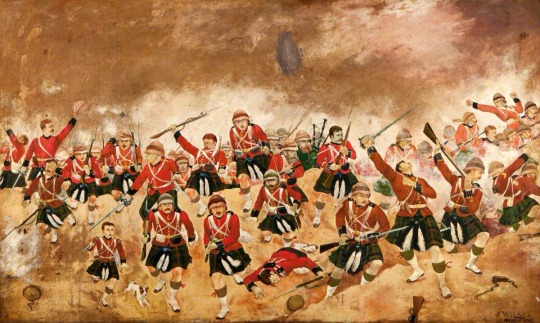
1st Battalion Queen's Own Cameron Highlanders Attacking the Position Held by the Rebel Egyptian Army at Tel-el-Kebir
James Wilson (active 1842–1883)
The Highlanders' Museum
1 note
·
View note
Video
youtube
French Egyptian Sword with British History - Tel el Kebir 1882
An unusual and historically interesting antique sword - a French 1822 sabre with Egyptian and British connections.
Egypt began importing French swords and weapons under the rule of Muhammad Ali Pasha.
8 notes
·
View notes
Photo
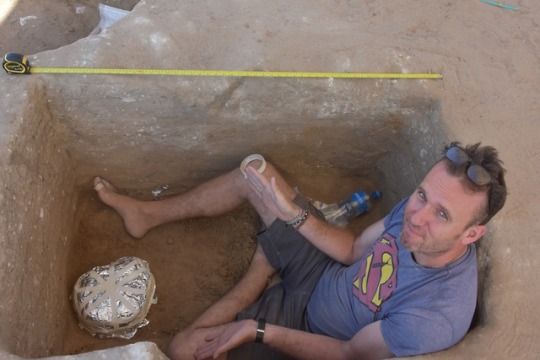



Day 18 - 22 August 2019 (KHD)
Dear All - a short one today!
Time is starting to press at us so the heat is on in every way down here in the trenches! Today we finished our analysis of the intriguing lady from yesterday, and I forced Tish to listen to the next section of my Arabic course (we aren't doing quite as well as before, but we are just about keeping up!).
We then went to the field and lifted the half body unfortunately truncated by an Islamic grave in recent centuries, then a massive mission ensued in which Jo's deep burial was invaded with six (SIX!) people, determined to get it out of the ground. It's superbly preserved at first glance, complete with organic materials that are probably the remains of funeral treatments, but when examined closer it is in fact shattered into a million tiny fragments held together by wet sand and is proving to be a total and utter trial.
Undaunted, inspectors, students and everyone with a trowel stampeded energetically to arms, and it got so crowded that Tish and I got pushed out so we ended up looking rather sheepishly at each other until the time came to get in and lift it. It was a massive trial - lots of butt-in-the-air swearing and contortions and shouting at each other. I made my point by walking straight into a steel bar that supports the shamsia and saw stars for the rest of the day (and I still have a headache and a huge bump now) and when people stopped laughing they were most supportive...! A mere hour and a half later the final section - the skull - was lifted, with so much sand around around it that I could barely carry the blasted thing to the dig hut.
To celebrate the arrival of the one-day weekend, all the staff gathered up the armed guards (yep - we have armed guards! We are that important!) and went to Tel el Kebir, where Abu Larry (that's my dad) went 77 years ago on manoeuvres with the British Army. He always spoke of it fondly, and it's a nice place although I am never at my best when shopping. The locals couldn't get enough of us however, and I have starred in many selfies as a result. The most surreal moment though was meeting a small girl who looked as Egyptian as you could imagine...but with the most electric light blue eyes, which was HIGHLY disconcerting not least because my father had the same shade of eyes and was apparently quite the dish back in 1942...so what are the chances of her being a long lost relative?!
Signing off. My esteemed roommate is already asleep - perhaps unconscious would be a better word, thanks in part to Grant's Whisky - so I had better stop making such a racket.
Have a lovely Friday!
Dr. Owens & the KHD Team
#Egyptian archaeology#predynastic Egypt#Dr Lawrence S. Owens#Egyptian history#Nile Delta archaeology#archaeology#Egyptian predynastic burials#Egyptology
4 notes
·
View notes
Text
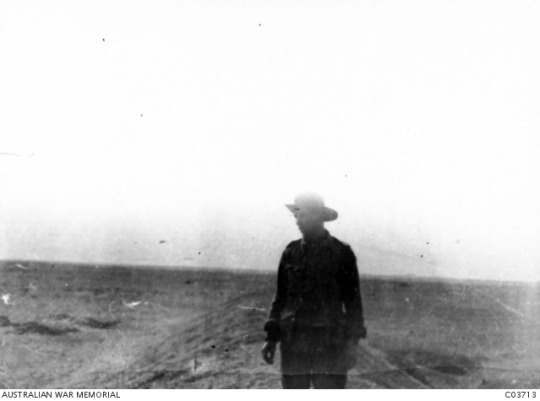
There are places in this world that seem to attract battles like moths to a flame. Most often due to geography these sites become places of conflict for hundreds of years. In this photograph a lone Australian trooper looks over the remains of defences at the battlesite of Tel-el-Kebir fought in 1882 between British and Egyptian forces.
20 notes
·
View notes
Photo

he Battle of Tel El Kebir:
*Date: 13th of September 1882
*Result: British Victory
*Troops: 13,000 (British) 15,000 (Egypitan)
*Casualties: 57 killed (British) 1,396 killed (Egyptian)
1 note
·
View note
Photo

The Guards at Tel-el-Kebir 13 September 1882 by Richard Caton Woodville.
#british army#history#military history#brigade of guards#redcoat#redcoats#british empire#tel-el-kebir
47 notes
·
View notes
Text

31st December 1897 - Major General Charles Gregorie was appointed Colonel of the Regiment from this date. Charles Frederick Gregorie was born on November 24th 1834. He was educated at Westminster School, and after leaving school in 1853, worked as a clerk in the Post Office for two years. In 1855 he joined the army as an ensign in the 23rd Regiment of Foot (Royal Welsh Fusiliers) and was promoted lieutenant the same year. In that year he served in the Crimean War. In May 1857 he was appointed adjutant and served with his regiment in the Indian mutiny of 1857-58. Gregorie was promoted captain in 1859 and served in Malta for two years before returning to England. In 1871 he was promoted major and joined the 18th Foot. In 1878, after 24 years’ service, he was promoted lieutenant-colonel, and then brevet colonel in 1881. In 1882 he served in the Egyptian Campaign, taking part in the battle of Tel-el-Kebir. In 1890 he was promoted major-general. Gregorie was by reputation a strict disciplinarian and an unsympathetic father to his ten children.
#18thfoot #royalirishregiment
0 notes
Text
Events 9.13
585 BC – Lucius Tarquinius Priscus, king of Rome, celebrates a triumph for his victories over the Sabines, and the surrender of Collatia.
509 BC – The Temple of Jupiter Optimus Maximus on Rome's Capitoline Hill is dedicated on the ides of September.
379 – Yax Nuun Ahiin I is crowned as 15th Ajaw of Tikal
533 – Belisarius of the Byzantine Empire defeats Gelimer and the Vandals at the Battle of Ad Decimum, near Carthage, North Africa.
1229 – Ögedei Khan is proclaimed Khagan of the Mongol Empire in Kodoe Aral, Khentii: Mongolia.
1437 – Battle of Tangier: a Portuguese expeditionary force initiates a failed attempt to seize the Moroccan citadel of Tangier.
1501 – Italian Renaissance: Michelangelo begins work on his statue of David.
1504 – Queen Isabella and King Ferdinand issue a Royal Warrant for the construction of a Royal Chapel (Capilla Real) to be built.
1541 – After three years of exile, John Calvin returns to Geneva to reform the church under a body of doctrine known as Calvinism.
1584 – San Lorenzo del Escorial Palace in Madrid is finished.
1609 – Henry Hudson reaches the river that would later be named after him – the Hudson River.
1645 – Wars of the Three Kingdoms: Scottish Royalists are defeated by Covenanters at the Battle of Philiphaugh.
1743 – Great Britain, Austria and the Kingdom of Sardinia sign the Treaty of Worms.
1759 – Battle of the Plains of Abraham: the British defeat the French near Quebec City in the Seven Years' War, known in the United States as the French and Indian War.
1782 – American Revolutionary War: Franco-Spanish troops launch the unsuccessful "grand assault" during the Great Siege of Gibraltar.
1788 – The Philadelphia Convention sets the date for the first presidential election in the United States, and New York City becomes the country's temporary capital.
1791 – King Louis XVI of France accepts the new constitution.
1808 – Finnish War: In the Battle of Jutas, Swedish forces under Lieutenant General Georg Carl von Döbeln beat the Russians, making von Döbeln a Swedish war hero.
1812 – War of 1812: A supply wagon sent to relieve Fort Harrison is ambushed in the Attack at the Narrows.
1814 – In a turning point in the War of 1812, the British fail to capture Baltimore. During the battle, Francis Scott Key composes his poem "Defence of Fort McHenry", which is later set to music and becomes the United States' national anthem.
1843 – The Greek Army rebels (OS date: September 3) against the autocratic rule of king Otto of Greece, demanding the granting of a constitution.
1847 – Mexican–American War: Six teenage military cadets known as Niños Héroes die defending Chapultepec Castle in the Battle of Chapultepec. American troops under General Winfield Scott capture Mexico City in the Mexican–American War.
1848 – Vermont railroad worker Phineas Gage survives an iron rod 1+1⁄4 inches (3.2 cm) in diameter being driven through his brain; the reported effects on his behavior and personality stimulate discussion of the nature of the brain and its functions.
1862 – American Civil War: Union soldiers find a copy of Robert E. Lee's battle plans in a field outside Frederick, Maryland. It is the prelude to the Battle of Antietam.
1880 – The Basuto Gun War breaks out after the Basuto launch a rebellion against the Cape Colony.
1882 – Anglo-Egyptian War: The Battle of Tel el-Kebir is fought.
1898 – Hannibal Goodwin patents celluloid photographic film.
1899 – Henry Bliss is the first person in the United States to be killed in an automobile accident.
1899 – Mackinder, Ollier and Brocherel make the first ascent of Batian (5,199 m – 17,058 ft), the highest peak of Mount Kenya.
1900 – Filipino insurgents defeat a small American column in the Battle of Pulang Lupa, during the Philippine–American War.
1906 – The Santos-Dumont 14-bis makes a short hop, the first flight of a fixed-wing aircraft in Europe.
1914 – World War I: The Battle of Aisne begins between Germany and France.
1922 – The final act of the Greco-Turkish War, the Great Fire of Smyrna, commences.
1923 – Following a military coup in Spain, Miguel Primo de Rivera takes over, setting up a dictatorship.
1933 – Elizabeth McCombs becomes the first woman elected to the New Zealand Parliament.
1942 – World War II: Second day of the Battle of Edson's Ridge in the Guadalcanal Campaign. U.S. Marines successfully defeat attacks by the Japanese with heavy losses for the Japanese forces.
1944 – World War II: Start of the Battle of Meligalas between the Greek Resistance forces of the Greek People's Liberation Army (ELAS) and the collaborationist security battalions.
1948 – Deputy Prime Minister of India Vallabhbhai Patel orders the Army to move into Hyderabad to integrate it with the Indian Union.
1948 – Margaret Chase Smith is elected United States senator, and becomes the first woman to serve in both the U.S. House of Representatives and the United States Senate.
1953 – Nikita Khrushchev is appointed General Secretary of the Communist Party of the Soviet Union.
1956 – The IBM 305 RAMAC is introduced, the first commercial computer to use disk storage.
1956 – The dike around the Dutch polder East Flevoland is closed.
1962 – An appeals court orders the University of Mississippi to admit James Meredith, the first African-American student admitted to the segregated university.
1964 – South Vietnamese Generals Lâm Văn Phát and Dương Văn Đức fail in a coup attempt against General Nguyễn Khánh.
1964 – Martin Luther King Jr. addresses a crowd of 20,000 West Berliners on Sunday, in Waldbühne.
1968 – Cold War: Albania leaves the Warsaw Pact.
1971 – State police and National Guardsmen storm New York's Attica Prison to quell a prison revolt, which claimed 43 lives.
1971 – Chairman Mao Zedong's second in command and successor Marshal Lin Biao flees China after the failure of an alleged coup. His plane crashes in Mongolia, killing all aboard.
1977 – General Motors introduces Diesel engine, with Oldsmobile Diesel engine, in the Delta 88, Oldsmobile 98, and Oldsmobile Custom Cruiser models amongst others.
1979 – South Africa grants independence to the "homeland" of Venda (not recognised outside South Africa).
1982 – Spantax Flight 995 crashes at Málaga Airport during a rejected takeoff, killing 50 of the 394 people on board.
1985 – Super Mario Bros. is released in Japan for the NES, which starts the Super Mario series of platforming games.
1986 – A magnitude 6.0 earthquake strikes Kalamata, Greece with a maximum Modified Mercalli intensity of X (Extreme), killing at least 20 and causing heavy damage in the city.
1987 – Goiânia accident: A radioactive object is stolen from an abandoned hospital in Goiânia, Brazil, contaminating many people in the following weeks and causing some to die from radiation poisoning.
1988 – Hurricane Gilbert is the strongest recorded hurricane in the Western Hemisphere, later replaced by Hurricane Wilma in 2005 (based on barometric pressure).
1989 – Largest anti-Apartheid march in South Africa, led by Desmond Tutu.
1993 – Israeli Prime Minister Yitzhak Rabin shakes hands with Palestine Liberation Organization chairman Yasser Arafat at the White House after signing the Oslo Accords granting limited Palestinian autonomy.
1997 – A German Air Force Tupolev Tu-154 and a United States Air Force Lockheed C-141 Starlifter collide in mid-air near Namibia, killing 33.
2001 – Civilian aircraft traffic resumes in the United States after the September 11 attacks.
2007 – The Declaration on the Rights of Indigenous Peoples is adopted by the United Nations General Assembly.
2007 – The McLaren F1 team are found guilty of possessing confidential information from the Ferrari team, fined $100 million, and excluded from the constructors' championship standings.
2008 – Delhi, India, is hit by a series of bomb blasts, resulting in 30 deaths and 130 injuries.
2008 – Hurricane Ike makes landfall on the Texas Gulf Coast of the United States, causing heavy damage to Galveston Island, Houston, and surrounding areas.
2013 – Taliban insurgents attack the United States consulate in Herat, Afghanistan, with two members of the Afghan National Police reported dead and about 20 civilians injured.
2018 – The Merrimack Valley gas explosions: One person is killed, 25 are injured, and 40 homes are destroyed when excessive natural gas pressure caused fires and explosions.
1 note
·
View note
Photo

Jan 7 1916 "Men of the 9th Battalion relaxing at the site of the Tel el Kebir camp, Egypt, before pitching their tents" https://t.co/EVOW0DgRo3 https://t.co/gbB1PrpX5X http://twitter.com/ThisDayInWWI/status/1082291197199020032
9 notes
·
View notes
Photo
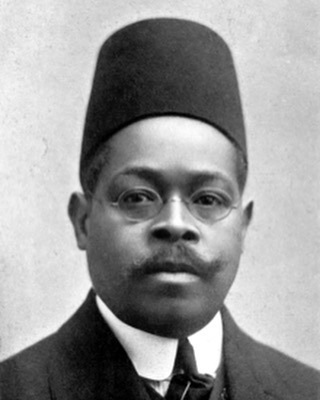
Dusé Mohamed Ali (Bey Effendi) (21 November 1866 – 25 June 1945) was a Sudanese-Egyptian actor and political activist, who became known for his African nationalism. He was also a playwright, historian, journalist, editor, and publisher. In 1912 he founded the African Times and Orient Review, later revived as the African and Orient Review, which was published in total through 1920. He lived and worked mostly in England, with time in the US and Nigeria. In the latter location, he founded the Comet Press Ltd and The Comet newspaper in Lagos. He received his early training in Egypt, but at the age of 9 or 10, his father arranged for him to go to England to be educated, His father died in 1882 while serving at the Battle of Tel el-Kebir in Egypt. He was forced to return to Egypt. After settling affairs with his father's estate, he returned to England. As the ward of Canon Berry, he pursued studies at King's College London. He had originally intended to study as a doctor and had started on related studies before his father's death. Afterward, he wanted to write and act. On completing his studies at the University of London, he was in the company of Herbert Beerbohm Tree and Lillie Langtry's production of Antony and Cleopatra at the Royal Princess Theatre, London. As an actor, he toured the British Isles. He produced Othello and The Merchant of Venice at Hull, Yorkshire, playing the parts of Othello and the Prince of Morocco. He earned praise from the British press. He wrote several plays, producing The Jew's Revenge at the Royal Surrey Theatre in London, A Cleopatra Night at Dundee, and the Lily of Bermuda, a musical comedy at the Theatre Royal, Manchester. The productions were praised by the British and American press. His production and performance in A Daughter of Judah which he first produced in the Glasgow Empire Theatre (GET) received particularly good reviews. #africanhistory365 #africanexcellence https://www.instagram.com/p/CH_SBz7LheFuBZtkLWGQJacY2xHctyz8Dtemds0/?igshid=e997ji3sr162
1 note
·
View note